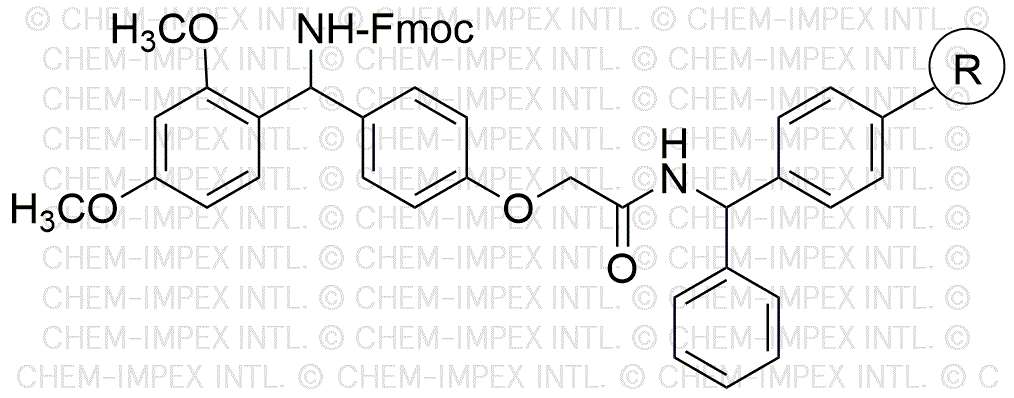4-(2', 4'-Dimethoxyphenyl-Fmoc-aminomethyl)-phenoxyacetamino-BHA resin is widely utilized in research focused on:
- Peptide Synthesis: This resin is commonly used in solid-phase peptide synthesis, allowing researchers to efficiently create complex peptides for various applications, including drug development and biological research.
- Drug Discovery: The resin facilitates the synthesis of peptide libraries, which are crucial for identifying potential drug candidates and understanding their interactions with biological targets.
- Bioconjugation: Its unique chemical structure enables effective conjugation with biomolecules, enhancing the development of targeted therapies and diagnostic agents in the pharmaceutical industry.
- Research in Cancer Therapeutics: The resin can be utilized to create peptide-based therapeutics that specifically target cancer cells, offering a promising avenue for developing more effective treatments.
- Customizable Functionalization: Researchers appreciate the ability to modify the resin for specific applications, providing flexibility in experimental design and improving the efficiency of synthesis processes.
General Information
Properties
Safety and Regulations
Applications
4-(2', 4'-Dimethoxyphenyl-Fmoc-aminomethyl)-phenoxyacetamino-BHA resin is widely utilized in research focused on:
- Peptide Synthesis: This resin is commonly used in solid-phase peptide synthesis, allowing researchers to efficiently create complex peptides for various applications, including drug development and biological research.
- Drug Discovery: The resin facilitates the synthesis of peptide libraries, which are crucial for identifying potential drug candidates and understanding their interactions with biological targets.
- Bioconjugation: Its unique chemical structure enables effective conjugation with biomolecules, enhancing the development of targeted therapies and diagnostic agents in the pharmaceutical industry.
- Research in Cancer Therapeutics: The resin can be utilized to create peptide-based therapeutics that specifically target cancer cells, offering a promising avenue for developing more effective treatments.
- Customizable Functionalization: Researchers appreciate the ability to modify the resin for specific applications, providing flexibility in experimental design and improving the efficiency of synthesis processes.
Documents
Safety Data Sheets (SDS)
The SDS provides comprehensive safety information on handling, storage, and disposal of the product.
Product Specification (PS)
The PS provides a comprehensive breakdown of the product’s properties, including chemical composition, physical state, purity, and storage requirements. It also details acceptable quality ranges and the product's intended applications.
Certificates of Analysis (COA)
Search for Certificates of Analysis (COA) by entering the products Lot Number. Lot and Batch Numbers can be found on a product’s label following the words ‘Lot’ or ‘Batch’.
Número de catálogo
Número de lote/lote
Certificates Of Origin (COO)
This COO confirms the country where the product was manufactured, and also details the materials and components used in it and whether it is derived from natural, synthetic, or other specific sources. This certificate may be required for customs, trade, and regulatory compliance.
Número de catálogo
Número de lote/lote
Safety Data Sheets (SDS)
The SDS provides comprehensive safety information on handling, storage, and disposal of the product.
DownloadProduct Specification (PS)
The PS provides a comprehensive breakdown of the product’s properties, including chemical composition, physical state, purity, and storage requirements. It also details acceptable quality ranges and the product's intended applications.
DownloadCertificates of Analysis (COA)
Search for Certificates of Analysis (COA) by entering the products Lot Number. Lot and Batch Numbers can be found on a product’s label following the words ‘Lot’ or ‘Batch’.
Número de catálogo
Número de lote/lote
Certificates Of Origin (COO)
This COO confirms the country where the product was manufactured, and also details the materials and components used in it and whether it is derived from natural, synthetic, or other specific sources. This certificate may be required for customs, trade, and regulatory compliance.

